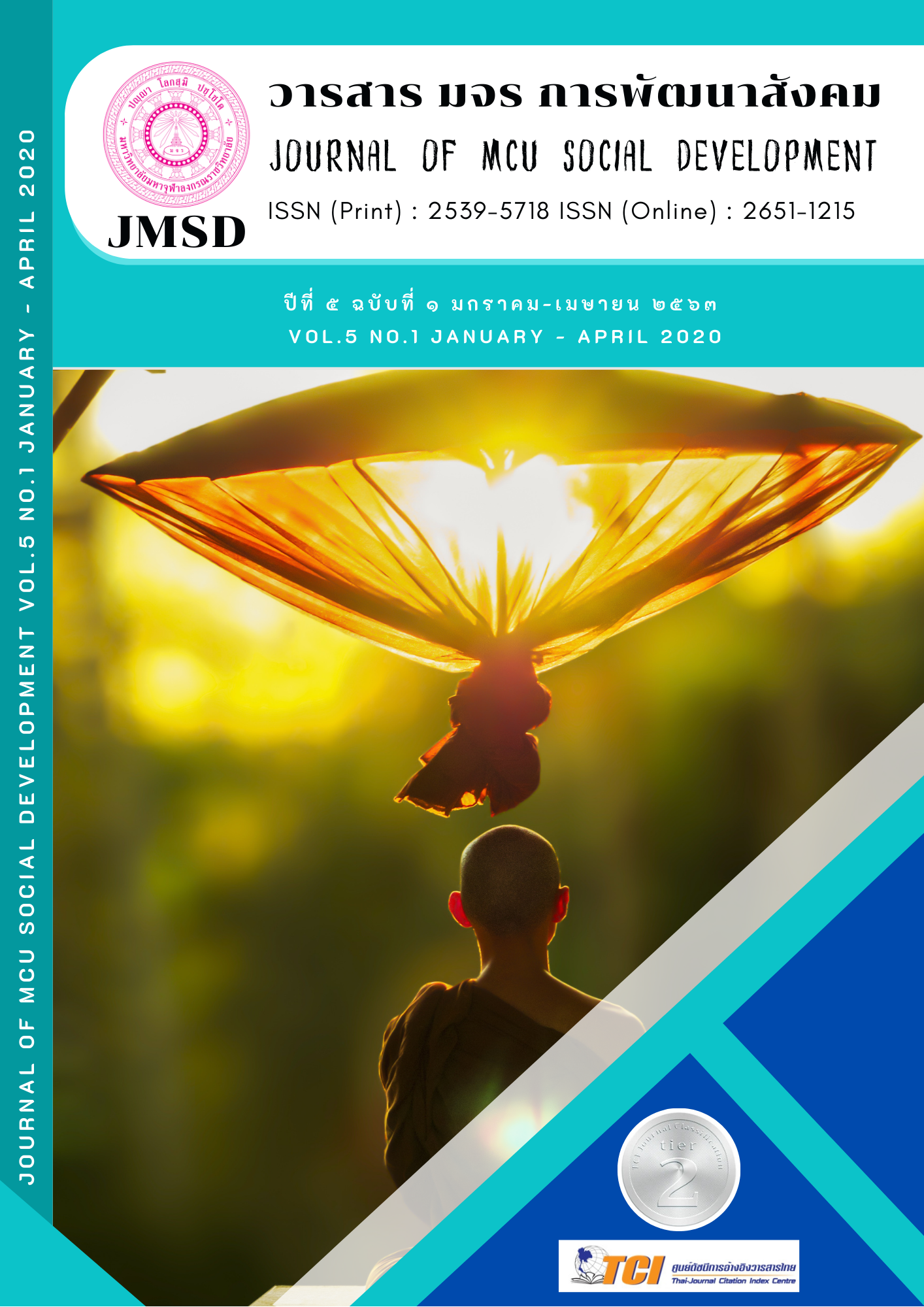พุทธเศรษฐศาสตร์ในทัศนะของปราชญ์ในประเทศและต่างประเทศ
คำสำคัญ:
พุทธเศรษฐศาสตร์, ปราชญ์ในประเทศไทย, นักปราชญ์โลกบทคัดย่อ
บทความวิจัยฉบับนี้ มีวัตถุประสงค์ดังนี้ 1) เพื่อศึกษาหลักพุทธเศรษฐศาสตร์ในทัศนะของปราชญ์ 2) เพื่อศึกษาวิธีการและแนวปฏิบัติทางพุทธเศรษฐศาสตร์ในทัศนะของปราชญ์ทั้งในประเทศและต่างประเทศ 3) เพื่อศึกษาวิธีการการประยุกต์ใช้หลักธรรมทางพุทธเศรษฐศาสตร์ของชุมชนต้นแบบในสังคมไทย และ 4) เพื่อศึกษาการวิเคราะห์ชุมชนต้นแบบที่นำหลักพุทธธรรมในการเสริมสร้างหลักเศรษฐศาสตร์ เป็นการศึกษาโดยการใช้การวิจัยเชิงคุณภาพ (Qualitative Research) เป็นการศึกษาโดยใช้การวิจัยเชิงเอกสาร (Documentary Research) โดยรวบรวมข้อมูลทำการถอด บทความ ตำรา หนังสือ สิ่งพิมพ์ จากหนังสือ ตำรา รายงานงานวิจัย บทความทางวิชาการ วารสาร และเอกสารต่าง ๆ เป็นต้น จากนักปราชญ์ด้านพุทธเศรษฐศาสตร์โลก วิเคราะห์ตามเนื้อหา (Content analysis) และสังเคราะห์ข้อมูล ผลการวิจัยพบว่า
- การทำความเข้าใจพันธะหน้าที่ในชีวิตมนุษย์อย่างถ่องแท้ ไม่สามารถทำได้ด้วยแนวคิดสัญญาประชาคมแต่เพียงอย่างเดียว แต่ควรน้อมนำหลักคิดของพระพุทธองค์เรื่องพันธะหน้าที่เชิงอำนาจเข้ามาประกอบด้วยคุณูปการ คือการนำพาคนต่างที่ต่างความคิดมาแลกเปลี่ยนสังสรรค์กันทางปัญญาและทางวัฒนธรรม การพัฒนาประเทศที่เรียกว่า “ความสุขมวลรวมประชาชาติ” โดยความคิดดังกล่าวเน้นการพัฒนาเพื่อให้ประชาชนมีความสุขและความพึงพอใจ มากกว่าวัดการพัฒนาด้วยผลิตภัณฑ์มวลรวมประชาชาติ เศรษฐศาสตร์แนวพุทธ ก็คือ มัตตัญญุตา ความรู้จักประมาณ รู้จักพอดีในการบริโภค หมายถึงความพอดีที่ให้คุณภาพของชีวิตมาบรรจบกับความพึงพอใจในคำสอนแสดงข้อปฏิบัติของพุทธศาสนิกชน
- เป็นหลักทฤษฎีตามแนวทางเศรษฐกิจพอเพียง เช่น สันโดษ 3 อย่าง คือ 1) ยถาพลสันโดษ ใช้จ่ายตามกำลัง 2) ยถาลาภสันโดษ ใช้จ่ายตามรายได้ 3) ยถาสารุปสันโดษ ใช้จ่ายตามความจำเป็น เป็นวิธีการที่พระบาทสมเด็จพระเจ้าอยู่หัวรัชกาลที่ 9 ทรงเรียกว่า “เศรษฐกิจแบบพอเพียงกับตัวเอง” จุดประสานแนวคิดระหว่างเศรษฐศาสตร์กระแสหลักกับวิถีพุทธ ที่เน้นระบบคุณค่าให้ควบคู่ไปกับความคุ้มค่า พุทธเศรษฐศาสตร์มีจุดเด่นอยู่ตรงที่เศรษฐศาสตร์กระแสหลักเน้นตามตัณหา เน้นการสนองตัณหา เน้นสนองผู้บริโภค หลักธรรมหลักที่กลุ่มนำมาใช้ คือ ความซื่อสัตย์ อดทน สามัคคี จริงใจต่อตนเองและผู้อื่น
- แนวคิดและทฤษฎีการผลิต แนวคิดและทฤษฎีการบริโภค แนวคิดและทฤษฎีการเงิน แนวคิดปัจจัยพื้นฐานของมนุษย์ แนวคิดความสุขของชีวิตมนุษย์ แนวคิดการบริโภคใช้สอยปัจจัยพื้นฐาน แนวคิดคุณค่าของกาลเวลา หลักการวิธีการและองค์ประกอบทางเศรษฐศาสตร์ตามหลักพระพุทธศาสนา ซึ่งประกอบด้วย หลักการเศรษฐศาสตร์ตามหลักพระพุทธศาสนา วิธีการเศรษฐศาสตร์ตามหลักพระพุทธศาสนา และองค์ประกอบเศรษฐศาสตร์ตามหลักพระพุทธศาสนา
- ชุมชนต้นแบบและรูปแบบการประยุกต์ใช้หลักพุทธธรรมในประเทศไทย คือ 1) แนวทางและรูปแบบพุทธเศรษฐศาสตร์ในประเทศไทย 2) แนวทางในการประยุกต์ใช้พุทธเศรษฐศาสตร์ในชุมชนตัวอย่างในสังคมไทย 3) รูปแบบการเรียนรู้การประยุกต์ใช้พุทธเศรษฐศาสตร์ในชุมชน
เอกสารอ้างอิง
พระไพศาล วิสาโล. (2546). พุทธศาสนาไทยในอนาคต แนวโน้มและทางออกจากวิกฤต. กรุงเทพมหานคร: มูลนิธิสดศรี-สฤษดิ์วงศ์.
มหาจุฬาลงกรณราชวิทยาลัย. (2539). พระไตรปิฎกภาษาไทย ฉบับมหาจุฬาลงกรณราชวิทยาลัย. กรุงเทพมหานคร : โรงพิมพ์มหาจุฬาลงกรณราชวิทยาลัย.
สุชีพ ปุญญานุภาพ. (2539). พระไตรปิฎกฉบับสำหรับประชาชน. พิมพ์ครั้งที่ 16. กรุงเทพมหานคร : โรงพิมพ์มหามกุฏราชวิทยาลัย.
อภิรัฐ ตั้งกระจ่าง. (2545). เศรษฐศาสตร์มหภาค. กรุงเทพมหานคร : บริษัท ธรรมสาร จำกัด.
FAO. (10 ธ.ค. 2562). Rome Declaration on World Food Security and World Food Summit Plan of Action. World Food Summit. 1996. แหล่งที่มา: http://www.fao.org/wfs/final/rd-s.htm. สืบค้นเมื่อ 10 ธันวาคม 2562.
Martin Shaw. (2004) “Global after the Cold War” in May Hauk swarth and Maurice Kegan. eds. Encyclopedia of Government and Poetics. Vol. 2nd ed. (Routledge. 2004). 1081-2.



